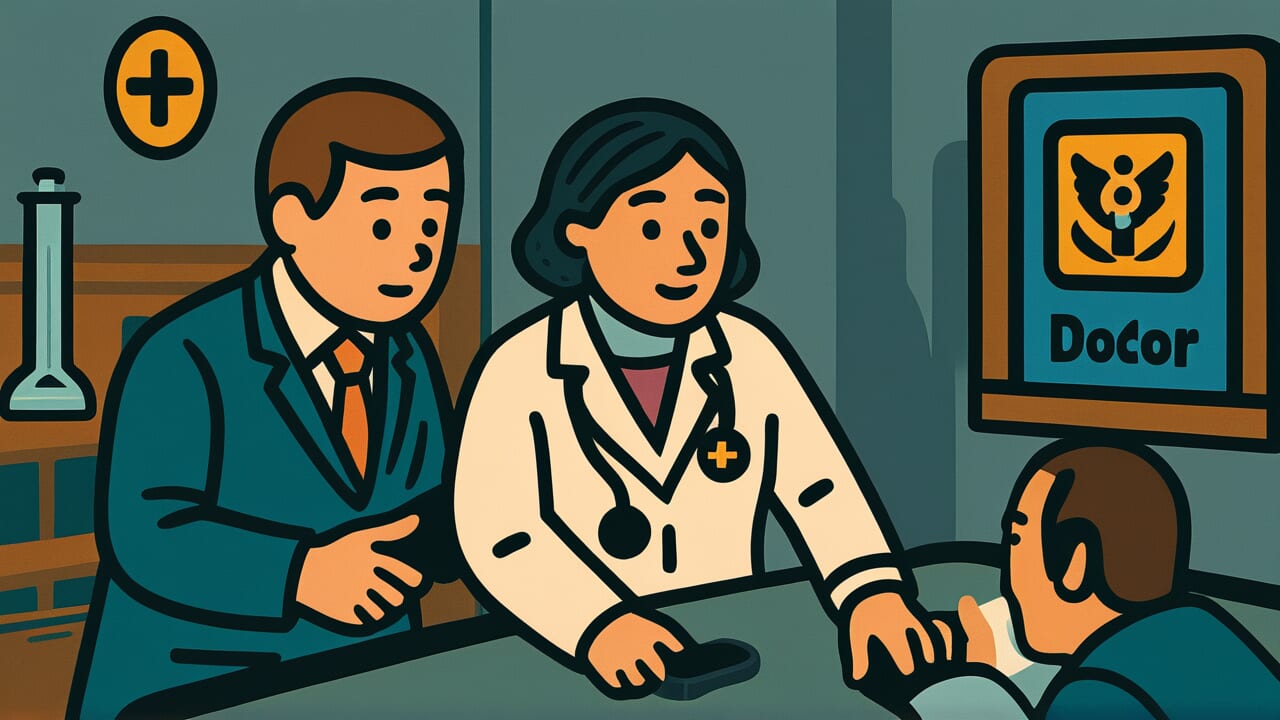How to Read “Good at doctors, bad at going”
Isha jōzu ni kakari heta
Meaning of “Good at doctors, bad at going”
This proverb points out that some people are good at going to doctors while others are bad at it. It highlights the difference in how patients approach medical care.
People who are good at doctors visit early when they notice something wrong. They explain their symptoms clearly and follow the doctor’s instructions carefully to recover.
People who are bad at going do the opposite. They endure symptoms too long and rush to the doctor only after things get worse. They struggle to explain what’s wrong or don’t take their prescribed medicine.
This proverb is used to show that medical outcomes depend not just on the doctor’s skill. The patient’s approach matters just as much. Two people with the same illness can have different results based on how they handle their care.
Even today, this saying reminds us that patients play an important role in their own health management and medical treatment.
Origin and Etymology
There are no clear historical records about where this proverb came from. However, based on its structure, it likely emerged from everyday life during or after the Edo period.
During the Edo period, town doctors became more common. Ordinary people had more chances to see doctors than before.
Medical care back then was very different from today. When patients visited, how they explained symptoms, and whether they followed recovery instructions all greatly affected treatment success.
The phrase “good at going” means more than just visiting a doctor. It includes the judgment to go at the right time, the ability to describe symptoms accurately, and the attitude to understand and follow instructions.
People who were “bad at going” endured symptoms until it was too late. They ignored doctor’s orders or unnecessarily switched doctors multiple times.
In an era when medicine was less advanced, patient wisdom mattered even more. This proverb captures folk wisdom about the importance of patients taking an active role in their own care.
Usage Examples
- He’s good at doctors, bad at going—he always endures symptoms too long and only goes to the hospital after things get worse
- I try not to be good at doctors, bad at going, so I consult a doctor right away when I notice concerning symptoms
Universal Wisdom
“Good at doctors, bad at going” touches on a universal truth about human self-management and judgment. Even when people receive the same service or support, some can use it well while others cannot.
This difference comes from more than just knowledge. It requires the ability to objectively assess your own condition, the decisiveness to act at the right time, and the humility to accept expert advice.
Everyone has a psychological resistance to admitting something is wrong with their body or mind. We tell ourselves “I’m still okay” or “It’ll get better on its own.” We delay taking action.
Sometimes we feel embarrassed that a doctor might say “it’s nothing serious.” These psychological barriers prevent us from getting proper care in time.
Following expert instructions means changing your lifestyle and thinking. This is harder than it sounds. People forget to take medicine, can’t stick to dietary restrictions, or fail to maintain exercise routines.
These differences in “execution ability” create differences in outcomes.
This proverb has endured because it brilliantly captures three elements of human maturity through the familiar context of medical care. The ability to seek help, accept help, and act on advice—these measure how mature we truly are.
When AI Hears This
When doctors treat their own symptoms lightly, it’s a rare case of reversed “information asymmetry” from economics. Normally in medical settings, doctors have information that patients lack.
But when doctors become patients, their expert knowledge actually interferes with accurate information transmission.
For example, a doctor feeling chest pain might self-diagnose: “This is probably just muscle pain.” The judgment itself may be correct. But problems arise when communicating this to another doctor.
If they say “just a little chest pain,” the examining doctor won’t sense urgency. The professional identity of being a doctor unconsciously weakens the “signal.”
According to economist Michael Spence’s signaling theory, when the informed party doesn’t send appropriate signals, overall market efficiency drops.
What’s more interesting is how implicit trust between doctors backfires. The assumption that “doctors can correctly evaluate their own symptoms” leads to skipping detailed questioning and tests.
This is “expert bias” from behavioral economics. People with knowledge tend to overconfide in their own judgment and undervalue third-party checks.
As a result, the risk increases of missing serious diseases that should have been caught early. It’s an ironic system failure where more knowledge distorts information transmission.
Lessons for Today
“Good at doctors, bad at going” teaches you that the ability to use expert help is itself an important skill worth developing. Modern society requires expert assistance in many areas beyond medicine—law, taxes, education, careers, and more.
The timing of seeking help, how you consult, and how you receive advice all greatly affect the results you get.
What’s especially important is having the courage to consult early. While you hesitate thinking “Is this worth consulting about?”, problems become more complex.
People who can consult experts at the stage of small concerns can prevent major troubles before they happen.
The ability to act on expert advice is equally important. No matter how good the advice, it’s meaningless if you don’t incorporate it into daily life.
You don’t need to be perfect. Start with what you can do, little by little. Consistency matters most.
To make your life better, develop the power to seek help, accept it, and act on it. This isn’t weakness at all—it’s the strength to live wisely.



Comments